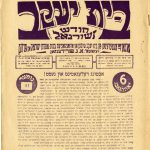The Bais Yaakov Journal
The Bais Yaakov Journal was a publication of Bais Yaakov and the Agudah. It was edited by Eliezer Gershon Friedenson, from his office in Łódź, and it appeared monthly (or sometimes more often) from 1923 to 1939. A Polish supplement accompanied the Yiddish journal beginning in 1924. The Polish supplement was discontinued in 1929, when Bais Yaakov embraced Orthodox Yiddishism (see bio of Solomon Shlyome Birnbaum). Below are links to selected issues, digitized and presented here with generous permission from YIVO. (Some issues are missing from the YIVO archives.)
We have provided summaries of the highlights of each issue, but along with these were regular features, including:
- reflections by Sarah Schenirer on the parsha, Jewish holidays, and Bais Yaakov topics in nearly every issue
- letters to the editor
- a column by ELiezer Gershon Friedensohn called “From Month to Month”
- an advice column called “Sister to Sister”
- book reviews
- announcements about Bais Yaakov events
- reports from local Bais Yaakovs and Bnos chapters
- announcements of births, engagements, marriages, and deaths
- advertisements.
Some of the regular journal topics came and went. For instance, in the late 1920s, Bais Yaakov published Yiddish translations of poetry by Rabindranath Tagore in nearly every issue, participating in the general European passion for his poetry.
As part of the ongoing nature of the Bais Yaakov Project, we will finish uploading the print runs of the Bais Yaakov Journal though 1939, and add the print runs of the Bais Yaakov Ruf (Lithuania), Bet Yaakov (Israel), and Beth Jacob (United States).
We also plan to translate the Yiddish, Polish, and Hebrew journals. If you would like to contribute your time and expertise, please contact us.

Bais Yaakov Journal Issue 143 (1937)
- Special double issue marking 25 years since the founding of Agudath Israel, and 20 years since the founding of Bais Yaakov. Several writers contribute essays for this event: Jacob Rosenheim’s "Bais Yaakov and Bnos: New Tasks" discusses misunderstandings of the rabbinic phrase “women are light-minded” and how it should not prevent the education of women. Yehuda Leib Orlean offers a reflection on Bais Yaakov ...

Bais Yaakov Journal Issue 145 (1937)
- Editorial "For a New Era” marks 15 years of the Bais Yaakov Journal's activities
- A report by Rabbi Benjamin Wolf Jakobson on "Bais Yaakov at the Third World Congress" summarizes decisions made at the congress in Marienbad, that took place on the 18-23.8.1937, including moving the central committee of Bais Yaakov to London, training more teachers, and instituting an inspection system of the schools ...

Bais Yaakov Journal Issue 146 (1937)
- Eliezer Gershon Friedensohn’s "Every Day–Every Time" discusses the current turbulent times through the story of Hanukkah and the repetition of the same narrative in the history of the Jewish people–in which Jews, despite being few against many, are saved, but it is crucial to remain pious, fighting hatred and secularization
- "Women Who Remained Noble", by Dr. Heshel Klepfish, discusses women in Polish literature; although ...

Bais Yaakov Journal Issue 147 (1938)
- Yehuda Leib Orlean’s article contrasts the characteristics of Jewish leaders and non-Jewish leaders, taking Rabbi Yohanan Ben Zakai as an example
- Poems by Dr. Ben Zion Fessler ("Around You"), and Yehudit Stein ("The World is Big"), and a translation of Judah Halevi’s "My Heart is in the East". Three short stories by Israel Emiat
- Dr. Nathan Birnbaum’s "Messiah Must Come" describes his interest ...

Bais Yaakov Journal Issue 148 (1938)
- Two articles dedicated to Sarah Schenirer on her third Yahrzeit: Yehuda Leib Orlean highlights her strength. Eliezer Gershon Friedensohn's "Seriousness, Simplicity, and Devotion" urges readers not to forget her name and her important work.
- A poem by Yehuda Leib Orlean on the ever-changing world focuses on the importance of Yiddish
- L. Shiff’s "A Heroic Woman" offers fragments from a story by Nachman of Bratzlav ...

Bais Yaakov Journal Issue 152 (1938)
- A historical article by Dr. Heshel Klepfish on 20 years of Polish independence discusses the history of Polish Jews alongside the history of the state.
- Yehuda Leib Orlean's "Are We Still the People of the Book?" accuses the second generation of the Haskalah (Jewish enlightenment) of abandoning Jewish books and culture, unlike the first generation, who were less distant from traditional Judaism
- Poems by ...

Bais Yaakov Journal Issue 156 (1939)
- In a political essay, Eliezer Gershon Friedensohn argues that Jews participated in the defense of Poland for the last 100 years and that every citizen must pay their debt by the 5th of May; in the upcoming war, where Poland will fight for peace, Jews as Polish citizens must fight alongside Poles
- Jacob Rosenheim’s "Women’s Fashion" presents the Jewish debate on female beauty of ...

Bais Yaakov Journal Issue 157 (1939)
- Rabbi. Elchanan Wasserman’s article "The Footprints of the Messiah" is the first part of an article (which was never completed). In these hard times, when it is difficult to believe what is happening, going back to reading the Jewish texts give one answer: God will save the Jews, as long as they study Torah and have faith
- M. W. Niestempower’s essay about the difficult ...

Bais Yaakov Journal Issue 150 (1938)
- A special double issue celebrating 15 years of the Bais Yaakov Journal, with congratulatory essays: Jacob Rosenheim's "A Word on the Anniversary" celebrates issue 150 and 15 years of activity, A. B. Ackerman congratulates the journal for overcoming obstacles and hardship, Rabbi Zvi Hirshhorn’s "Our People's Celebration" and a letter by David Flinker congratulate the Journal and wish for it to remain young. The ...
